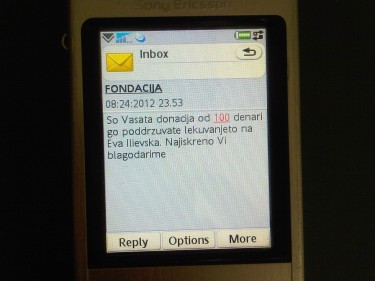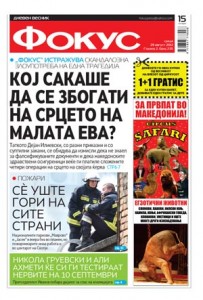A fact-checking intervention – a joint effort by Macedonian and Bulgarian social media users – has helped independent journalists expose forged documents used as lure for suspicious humanitarian donations.
During the previous weeks, Macedonian social media users were agitated after learning about alleged mistreatment of Eva Ilievska, a baby girl with malfunctioning heart, who was a subject of an online donation campaign a few months ago. Dozens of online portals and other media relayed the appeal for more funds, using titles like “Scandalous – Little Eva was Denied Health Care in Bulgaria – Due to Lack of Money for the Operation.”
People were donating money via designated humanitarian phone numbers and to the family's bank account, and indignantly shared such links [mk] via Facebook, calling upon their friends to contribute, too. These articles contained photos of the baby, who was born in April, and a scan of the alleged official document issued by a Bulgarian clinic.

A text message by the Foundation T-Mobile for Macedonia, informing that the user has donated 100 denars for Eva Ilievska's treatment. On top of this sum, the state takes +18% from the citizens as VAT (approx. EUR 2).
However, when a Facebook user from Bulgaria noticed this appeal, she quickly realized that the scanned document contained many factual inadequacies: the name and address of the hospital were wrong, the telephone numbers were strange, and, most of all, the text in Bulgarian looked as if it was not written by a speaker of the language, but appeared to be an automated online translation.
Other Bulgarians (including Global Voices’ Rayna St. and Veni Markovski) confirmed these facts [mk, bg] through Facebook comments, while their Macedonian friends tagged several journalists in order to involve them in the discussion. Over the weekend, the cat was out of the bag on a larger scale.
Immediate further research [mk] by professional journalist Meri Jordanovska from 24 Vesti (24 News), who contacted the child's father as well as the head of the Bulgarian clinic, revealed that the document was indeed a forgery. In fact, the girl's operation had already been completed and she was back in Skopje for further treatment.
Margarita Conzarova, M.D., the director of the Sofia-based Clinic for Child Diseases and Heart Surgery, confirmed that she had not issued such a letter. In fact, the EUR 25,000 had been paid by the Macedonian State Healh Fund (80%) and the parents (20%), presumably using part of the previously donated funds. The Bulgarian surgeon said that a new operation on the child was not to be conducted for at least a year.
Dozens of Macedonian portals and other media relayed the news [mk]. According to unofficial information in Jordanovska's article, over EUR 20,000 had been donated by concerned citizens.
http://www.youtube.com/watch?feature=player_embedded&v=3uPSPUtooNA
In the meantime, the Ilievski family members have been issuing contradictory statements. First, they were asking for more money via the this Facebook page [mk], then they were quoted claiming that the page was run “by the community” or that it had been hacked, and that they did not know who was asking for money, using appeals claiming that little Eva was to have a surgery in the next few days, and that EUR 3,000, then EUR 2,100 were still lacking.

“Who Wanted to Get Rich Over Little Eva's Heart?” The story made it to the front page of the Fokus daily.
Articles by another web-savvy journalist, Miroslava Simonovska of the Fokus daily and the Plusinfo portal, complemented the information, and showed [mk] that well after the operation, the father has continued to ask for money from people directly via e-mail. The director of the Skopje Clinic for Child Diseases, Aspazija Sofijanova, M.D., has filed criminal charges and the police started an investigation [mk] into possible fraud.
Macedonian citizens often donate money via text messages, as they believe that the three national mobile operators have checked the claims of the people who beg for money in order to solve health issues. So far, no statement by the mobile operators has been issued to the effect that they would return the money if the investigation proves fraud.
Journalists claim that, to their credit, the operators do not take a cut from the proceedings, but transfer the whole sum to bank accounts of the people in need, and the 18% VAT to the state budget.
One of the participants in the Facebook discussion wrote about the baby:
…Again, the biggest loser is the most innocent person…
Meri Jordanovska concluded her second article this way:
It remains unclear for what purpose did Eva's parents gather money and who is hiding behind the August 23 document, which claims that the Bulgarian clinic is asking for more money for treatment. The Ministry of the Interior is on the move to clear up this case, so that the citizens could regain trust in calls for humanitarian donations.







3 comments
i
still don’t know what to think (and feel) about this all. the baby IS
really ill, only inoperable until she reaches certain age. it’s
difficult (and i hope we will never need to) put ourselves in her
parents’ shoes – the shock and pain of having a young baby so ill, the powerlessness … maybe they were hoping
to stash the money for when the time for surgery comes, acting now
while the story was fresh and the wave of donations high … i don’t
know, i don’t want to defend them, but i don’t want to condemn them too
quickly, either i
just hope it does not discourage people from donating, and i hope
it encourages the state to cover the costs in full, so we don’t need to
donate for this, and can continue donating to support other things – alternative
culture, for instance. to be more involved in crowd funding, rather than fighting medical fires